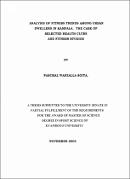Analysis of fitness trends among urban dwellers in Kampala: the case of selected health clubs and fitness studios
Abstract
Physical fitness is important in its general contribution to one s health. For effectiveness
programme delivery has to be handled professionally and ethically to meet specific
minimum standards. These include safety state-of-the-art equipment and trained
practitioners. When well harnessed, some of societal health problems traditionally
associated with hypokinetic conditions and sedentary work practices may be prevented,
reduced or even eliminated.
This study therefore assessed the extent to which personnel facilities and programmes
within health clubs in Kampala City meet the minimum professional standards as
required.
To elicit the data a number of research tools were employed, including Questionnaires,
Observation and Interviews with consumers and providers of products and services. A
random sample of 144 (23% of the target population) subjects was selected from 12
purposively selected health clubs out of 35 considered for the study. The data collected
\ as mainly subjected to qualitative treatment although at some point Chi-square, x
2,was
used to establish if there existed correlation between age and gender with participation.
The major findings of the study included:
• Fitness as a fast-growing industry in Kampala but embroild with weaknesses in
membership admission, low practitioner education levels and to a large extent
obsolete equipment they use.

